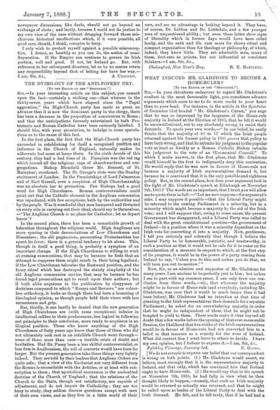THE DYING-OUT OF THE ANTI-POPERY CRY.
[To THE EDITOR OF THE 'SPECTATOR.] SIR,—In your interesting article on this subject, you remark upon the fact—certainly a striking one—that whereas in the thirty-seven years which have elapsed since the "Papal aggression," the High-Church party has made so great an advance that it is now the dominant party in the clergy, there has been a decrease in the proportion of conversions to Rome ; and that the anticipations formerly entertained by both Pro- testants and Roman Catholics have been curiously falsified. I should like, with your permission, to indulge in some specula- tions as to the cause Of this fact.
In the first place, the fact that the High-Church party has succeeded in establishing for itself a recognised position and influence in the Church of England, naturally makes its adherents feel more at home there. In the sixth decade of this century, they had a bad time of it. Paseyism was the red rag which roused all the religious rage of churchwardens and con- gregations. Bishop Blomfield threw Mr. Bennett, of St. Barnabas', overboard. The St. George's riots were the Sunday excitement of London. In the Premierships of Lord Palmerston and of Earl Russell, even a suspicion of High Churchmanship
• was an absolute bar to promotion. Few Bishops had a good word for High Churchmen. Roman controversialists could point out that the Catholic element in the Anglican communion was repudiated, with few exceptions, both by the authorities and ' by the people. Was it wonderful that men hampered and thwarted on every side in carrying out their ideal, should say to themselves, —` The Anglican Church is no place for Catholics ; let us depart hence '?
In the second place, there has been a remarkable growth of toleration throughout the religious world. High Anglicans are more sparing in their denunciations of Low Churchmen and Dissenters ; the old pugnacious, persecuting Protestantism has spent its force ; there is a general tendency to let alone. This, though in itself a good thing, is probably a symptom of an important change. If the High Churchman is willing to wink at evening communions, that may be because he feels that an attempt to suppress them might result in their being legalised ; if the Low Churchman tolerates the Eastward position, and the fussy ritual which has destroyed the stately simplicity of the old Anglican communion service, that may be because he has found legal prosecutions apt to recoil upon their authors ; but if both alike acquiesce in the publication by clergymen of doctrines compared to which "Essays and Reviews " are colour- less orthodoxy, it looks as though there had been a loosening of theological opinion, as though people held their views with less earnestness and grip.
Bat, thirdly, it can hardly be denied that the new generation of High Churchmen are (with some exceptions) inferior in intellectual calibre to their predecessors, less logical in following out principles to their conclusion, more ready to acquiesce in an illogical position. Those who know anything of the High Churchmen of forty years ago know that those of them who did not ultimately seek rest in an infallible Church went through— some of them more than once—a terrible crisis of doubt and hesitation. Had Dr. Posey been a less skilful controversialist, or less firm in Anglicanism, the roll of converts would have been far larger. But the present generation take these things very lightly indeed. They are told by their leaders that Anglioan Orders are quite safe ; that a view of the Eucharist not very different from the Roman is reconcilable with the Articles, or at least with sub- scription to them ; that apostolical succession is the undoubted doctrine of the Church of England ; that the relations of the Church to the State, though not satisfactory, are capable of adjustment, and do not impair its Catholicity ; they are too busy to study, they seldom discuss questions except with men of their own views, and so they live in a little world of their own, and see no advantage in looking beyond it. They have, of course, Dr. Liddon and Dr. Littledale, and a few younger men of unquestioned ability ; but even these latter show signs of liberality which in former days would have been called laxity, and the rank and file care more for showy ritual and compact organisation than for theology or philosophy, of which, indeed, they know little. They are admirable men, many of them, first-rate as priests, but not influential or consistent thinkers.—I am, Sir, &c., Chelmsford, New Year's Day. R. E. BARTLETT.






















































 Previous page
Previous page